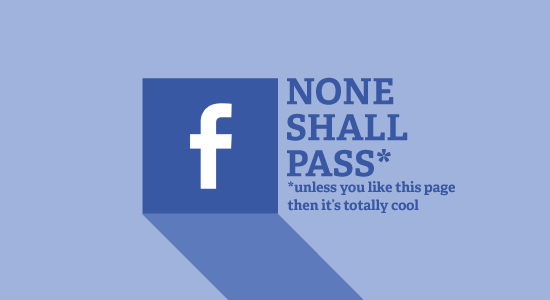
Here we go again… Early this month Facebook posted an update to their developer blog that effectively ended the practice of like-gating.
The revised policy says “You must not incentivize people to use social plugins or to like a Page.” This includes offering rewards, or gating apps or app content based on whether or not a person has liked a Page.
That’s about as clear as my favorite fishing hole after a heavy rain. Let’s break it down.
First of all what is “like-gating”? According to Facebook, the definition of like-gating is: “when you force a Facebook user who has not already liked your Page to like your Page before they can see content on a particular custom tab.”
Secondly the new change only affects blocking people from content for not liking your page or app. You can still run contests on Facebook that offer entries for liking a post.
Why the change?
Well imagine you like ‘Bobs Delicious Pet Food Palace’ Facebook page because it gives you an entry into a contest to win a free ipad. The problem is you don’t have any pets, but you love iPads. Suddenly your Facebook news feed is filled with updates on sales at bob’s pet food palace. After a few days you either, unlike the page or hide the content from your news feed. You’re annoyed because Bob is not delivering content you care about; Bob really doesn’t want you as a fan anyway, you’re never going to buy anything; and Facebook is ‘wasting’ valuable news feed real estate delivering irrelevant content. In this scenario everyone loses.
So this is a good thing?
I think it is. Everyone is going to get more meaningful content in their feed. A page owner will get more qualified followers and Facebook is going to get happier users. I think it’s a great move by Facebook. It’s also another reason to deliver content followers care about. You need to keep them engaged with your page.
As long as you’re delivering content that represents your brand, aligns with trackable business goals, and keeps your audiences interested you’ll be successful no matter what algorithm changes come down from the Facebooks, Googles, and Twitters of the world.



